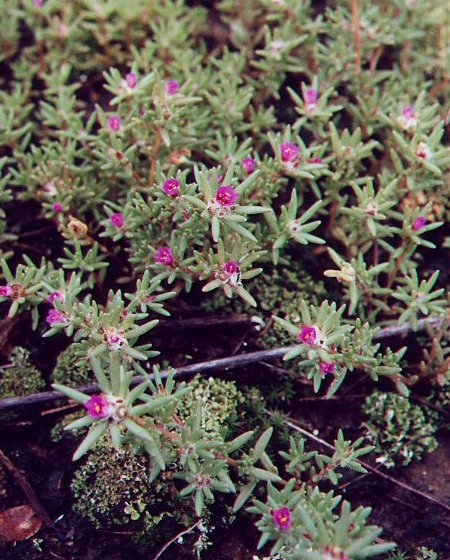Portulaca pilosa L.
Purslane

Native
CC = 7
CW = 5
MOC = 13
© DETenaglia
Portulaca pilosa L.Purslane | |
 |
Native CC = 7 CW = 5 MOC = 13 |
© DETenaglia |
|
Family - Portulacaceae Stems - From a taproot, multiple from base, branching, erect to ascending, herbaceous, succulent, terete, to +8cm long, glabrous but with tufts of pilose hairs in the leaf axils. Hairs white, to 3mm long. Leaves - Alternate, petiolate to subsessile, succulent, terete to slightly compressed, with a bluish-green tint, to -2cm long, acute. Petioles to 2mm long. Inflorescence - Terminal cluster of 2-6 flowers. Cluster subtended by a whorl of leaves. Flowers sessile, surrounded by dense white pilose hairs. Flowers - Petals 5, wine-colored, glabrous. Stamens 10, in a ring at the edge of the receptacle. Stigma 5(4)-lobed. Style glabrous. Ovary half inferior. Placentation basal. Sepals 2, greenish or with a purplish tint, acute, entire, broadly ovate to orbicular, +/-2mm long and broad. Fruit a circumsissle capsule.
Flowering - May - October. Habitat - Glades, rocky bluffs. Origin - Native to U.S. Other info. - This striking little plant is found in a handful of counties in western Missouri. Since it is succulent, it survives well on glades where water is scarce. Given good growing conditions, the plant can form fairly large mats. It would do well as a rock garden plant in cultivation. Photographs taken at Dave Rock Conservation Area, St. Clair County, MO., 7-27-00. |